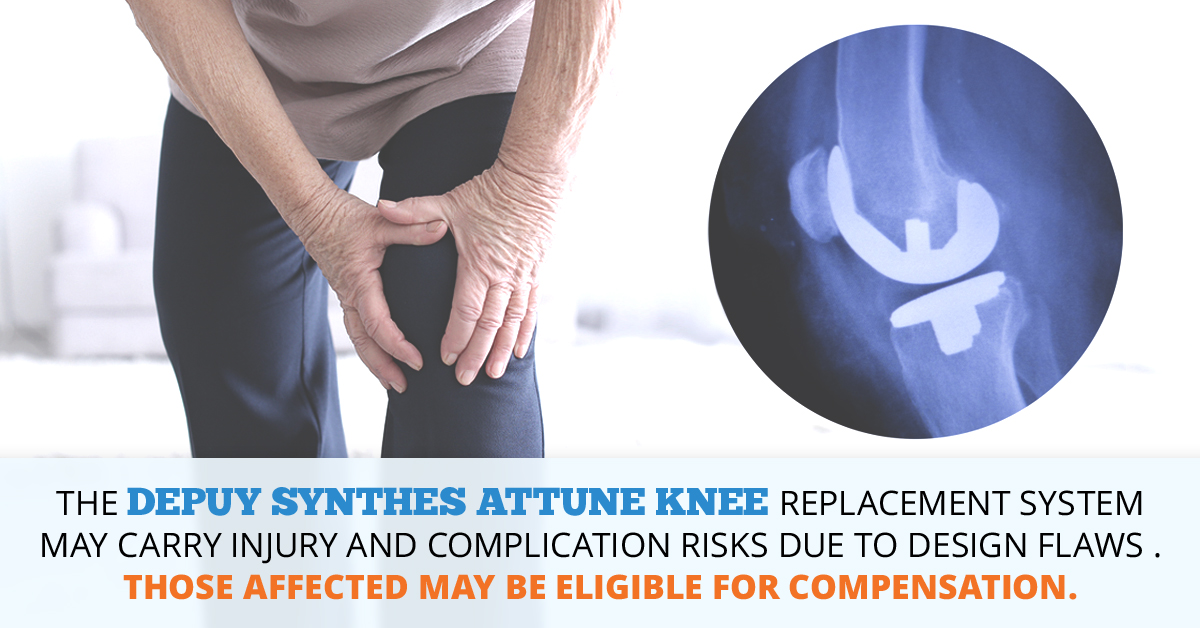How an Attune Knee Implant Lawsuit Can Help
- Hospital bills
- Long-term medical care
- Revision surgery
- Pain and suffering
- Lost wages due to the inability to work
- Future loss of earnings
- Permanent disability
The Attune Knee System, a medical device designed by DePuy Synthes to improve stability and range of motion in patients undergoing knee replacement surgery, has been linked to complaints from implant recipients of pain and premature device failure resulting in the need for revision surgery, among other serious problems. If you or a loved one received a DePuy Synthes Attune knee implant after January 2010, and you have since suffered complications like implant loosening or instability, joint paint, nerve damage, infection or device fracture, you may be entitled to financial compensation for your injuries. Contact a defective knee implant lawyer today to discuss your legal options.

An estimated 4.4 million Americans are living with artificial knee implants, and as the number of knee replacement systems being implanted in patients has increased, so, too, has the number of complications reported in connection with failed implants. From February 2003 to May 2013, for instance, the top six knee implant manufacturers issued 709 recalls due to flaws in the design or construction of their devices, and a whopping 277 (38%) of these recalled devices belonged to DePuy, the second-largest manufacturer of artificial knee and hip implants in the world. One of the most high-profile DePuy recalls was issued in 2010, for the company’s ASR metal-on-metal hip implant devices, which were associated with unusually high failure rates and other major complications.
One of DePuy’s more recent ventures, the Synthes Attune knee implant, was designed over a six-year period with the goal of improving clinical outcomes, reducing recovery time, and allowing knee implant recipients to return to their normal activities sooner than anticipated. Unfortunately, the knee replacement system has been linked to debilitating injuries in recipients, many of which may require revision surgery to remove or replace the implant. As a result, product liability lawyers across the country are investigating lawsuits on behalf of patients who received an Attune Knee replacement system and have since suffered from major complications as a result in flaws in the design of the knee implant.
If the Balseal is separated from the post, it has the potential to enter the surgical site and be left in the patient if the surgeon is unaware of the disassociation.
For patients undergoing knee replacement surgery, a knee implant that allows them to enjoy improved stability and range of motion, and helps them return to their normal activities is important. The Attune Knee System was introduced by DePuy Synthes as a result of the largest research and development project in the company’s history, and was designed to improve function through mobility and stability of the knee joint, compared to older models of knee replacement systems. However, when DePuy submitted the Attune Knee System to the FDA for premarket approval in 2010, the company claimed that the implant was “substantially equivalent to currently marketed devices,” including Zimmer’s NexGen CR Knee System, which was recalled in 2015, due to its early failure rate.
Dozens of artificial knee implants have been recalled over the years, the most common reason for recall being that the implant has failed to adhere to the bone. Unfortunately, the failure of a knee implant can cause significant pain and other serious problems for patients, including infection, bone loss, the need for revision surgery and extensive rehabilitation. In June 2015, the U.S. Food and Drug Administration (FDA) issued a recall for an Attune Knee Tibial Articulation Surface instrument, after discovering that the Balseal, or the small wire spring coil used in the range of motion testing to aid in tibial location prior to drilling peg holes, can become damaged and detach. This may allow the coil to enter the surgical site during the knee replacement surgery and remain in the patient if the surgeon is unaware that it detached.